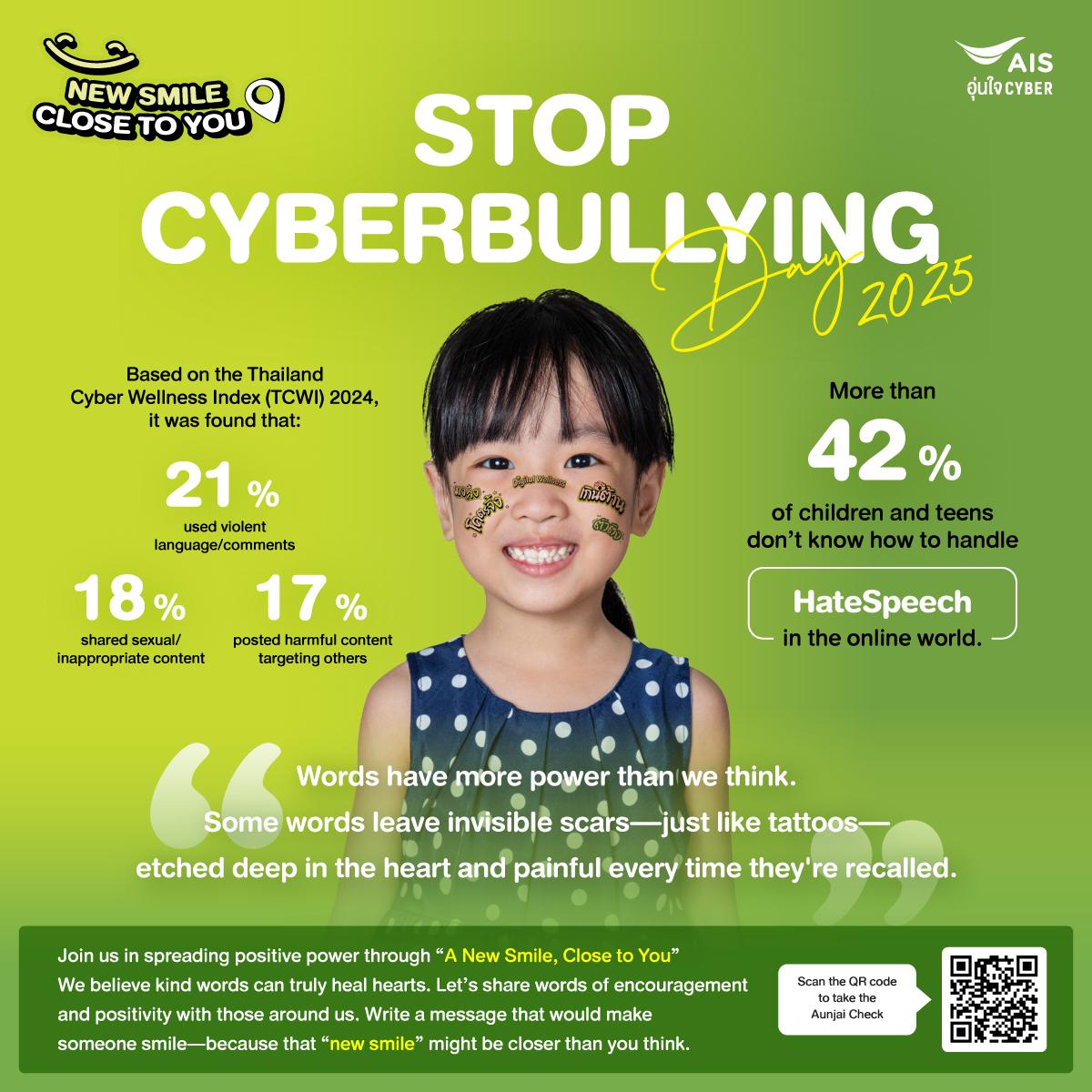
Cyberbullying is not just an online issues.It is an emotional wound that leaves invisible scars on children and teens. Thailand Cyber Wellness Index (TCWI) 2024 indicates that 42% of youth cannot cope with hate speech, while many admit to using harmful language themselves. These numbers represent lives weighed down by silence and pain.
AIS launched “Stop Cyberbullying Day 2025: A New Smile, Close to You” to confront this hidden epidemic. The idea is simple yet profound: if words can scar like tattoos, they can also heal. Where cruel words leave marks, kind words can restore confidence and create new smiles.
Our goals are clear:
Through this campaign, we strive to prove that empathy can be louder than cruelty, and that every new smile has the power to erase an old scar.
The inspiration for this campaign came from Cybersmile’s acclaimed “Words are Permanent” initiative, which showed how hurtful words leave lasting scars. That idea resonated deeply with us, but we reimagined it through a Thai lens and flipped its meaning. If words can cause permanent harm, they can also create permanent healing. This inversion became the foundation of AIS’s “Stop Cyberbullying Day 2025: A New Smile, Close to You.”
The metaphor of tattoos captured this perfectly. Tattoos are permanent marks on the skin, just as cyberbullying leaves permanent marks on the heart. But instead of focusing only on cruelty, we created tattoo stickers with positive words, turning scars into strength. Children were invited to wear them proudly, share them on Stories, and transform the symbol of pain into a collective act of kindness.
The execution blended on-ground participation with digital amplification. Tattoo kits were distributed to schools and communities, making the campaign tangible and fun. Online, authentic youth voices gave the campaign power: Sayamo, bullied for her curly hair, alongside LGBTQ advocates Mai, Lauren, and Thammachart, shared their real stories of resilience. Their honesty built trust and relatability. Together with more than 10 additional KOLs, their content generated 157.1K views across platforms, proving empathy can spread as quickly as cruelty.
We also embraced user participation. A TikTok filter created for the campaign inspired user-generated content with 17,098 views, showing young people were not only absorbing the message but actively sharing it.
Every touchpoint linked back to the Aunjai Check digital wellness platform. QR codes on materials and campaign prompts led users to assess their digital resilience and access coping tools. This bridge ensured the campaign moved beyond emotion into practical action.
Challenges were real. Cyberbullying is invisible, so we visualized it with the tattoo metaphor. Youth engagement can be fleeting, therefore, we made it playful and shareable. Authenticity is fragile—so we chose KOLs with lived experiences, not scripts. Measuring success can be abstract—so we tied results to behavior change. On launch day, over 20,000 people registered for Aunjai Check, proving the campaign sparked immediate action.
What made this unique was its inversion of a global idea. While Cybersmile emphasized the permanence of harm, AIS demonstrated the permanence of kindness. By combining research, creativity, and real human voices, this was not just a corporate initiative but a movement—turning scars into smiles and proving that empathy can endure as powerfully as cruelty.
On social media, authentic storytelling from KOLs such as Sayamo, Mai, Lauren, and Thammachart resonated strongly, generating 157.1K views across Tiktok platforms. Their stories inspired more than 100 additional KOLs to share the campaign, amplifying the message organically. Beyond influencers, children and teens themselves joined in—wearing tattoo stickers, sharing Stories, and turning scars into symbols of strength.
User-generated content amplified the message further. Our TikTok filter alone attracted 17,098 views, proving that young people were not just listening but actively contributing to the movement.
The campaign extended beyond digital channels into traditional media, gaining 10+ national headlines. This positioned cyberbullying not only as a youth issue but as a national conversation.
Most importantly, the campaign drove measurable change. On Stop Cyberbullying Day 2025, more than 20,000 people registered for the Aunjai Check digital wellness platform. This translated awareness into immediate action, giving thousands of young people tools to recognize, cope with, and prevent online harm.
These results were not just numbers on a chart. Each view was a story heard. Each sticker worn was an act of courage. Each filter shared was a ripple of hope. And each registration was a child reclaiming their strength.
Every number represents more than data.It represents a smile restored, a scar softened, and proof that cruelty does not have to be permanent. Because kindness can be, too.
